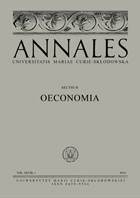Stosunek do edukacji finansowej w obszarze zarządzania finansami osobistymi a poziom transakcyjnego wykluczenia finansowego osób bezrobotnych w świetle badań własnych
The Attitude to Financial Education in the Area of Personal Finance Management and the Level of Transactional Financial Exclusion of the Unemployed in the Light of Own Research
Author(s): Anna NowackaSubject(s): Economy, Financial Markets, Socio-Economic Research
Published by: Wydawnictwo Naukowe Uniwersytetu Marii Curie-Sklodowskiej
Keywords: edukacja finansowa; zarządzanie finansami osobistymi; transakcyjne wykluczenie finansowe; osoby bezrobotne;financial education; personal finance management; transactional financial exclusion; unemploy
Summary/Abstract: Uzasadnienie teoretyczne: Stosunek do edukacji finansowej w obszarze zarządzania finansami osobistymi może być determinowany wieloma czynnikami, m.in. społeczno-demograficznymi oraz stopniem transakcyjnego wykluczenia finansowego. Zjawisko to związane jest ze stopniem ubankowienia.Cel artykułu: Określenie stosunku osób bezrobotnych do edukacji finansowej w obszarze zarządzania finansami osobistymi w zależności od poziomu transakcyjnego wykluczenia finansowego. W opracowaniu skoncentrowano się na jednym z segmentów wykluczenia finansowego, tzn. bankowym wykluczeniu finansowym w zakresie dostępu do transakcji płatniczych, mierzonym poziomem ubankowienia.Metody badawcze: Analiza stosunku do edukacji finansowej w obszarze zarządzania finansami osobistymi oraz do poziomów transakcyjnego wykluczenia finansowego została oparta na badaniach własnych i przeglądzie literatury przedmiotu. Dane uzyskane w wyniku przeprowadzonego badania z wykorzystaniem kwestionariusza ankiety na próbie 350 osób bezrobotnych zarejestrowanych w Miejskim Urzędzie Pracy w Płocku wykorzystano do weryfikacji trzech hipotez badawczych.Główne wnioski: Uzyskane wyniki badania wskazują na związek stosunku do edukacji finansowej w obszarze zarządzania finansami osobistymi z wybranymi cechami społeczno-demograficznymi osób bezrobotnych (takimi jak wiek, wykształcenie i okres zarejestrowania w urzędzie pracy) oraz z trzema poziomami ubankowienia. Nie stwierdzono natomiast istotnej statystycznie zależności między oceną umiejętności finansowych w obszarze zarządzania finansami osobistymi a stopniem transakcyjnego wykluczenia finansowego. Biorąc pod uwagę wyniki przeprowadzonej analizy, zasadne wydaje się podejmowanie inicjatyw edukacyjnych wśród osób bezrobotnych, mających na celu ograniczanie stopnia transakcyjnego wykluczenia finansowego.Theoretical background: The attitude to financial education in the area of personal finance management can be determined by many factors, i.a. the socio-demographic ones and the degree of transactional financial exclusion. The phenomenon of is related to the degree of banking.Purpose of the article: Examination of the relationship between the attitude of the unemployed to the financial education in the area of personal finance management and different levels of transactional financial exclusion. The study focuses on one of the segments of financial exclusion, i.e. banking financial exclusion in the area of access to payment transactions, measured by the level of banking.Research methods: The analysis of the attitude to financial education in the area of personal finance management as well as the levels of transactional financial exclusion was based on the own research and review of the literature on the subject. The data obtained as a result of the study with the use of a questionnaire on the 350 unemployed people registered at the Municipal Employment Office in Płock were used to verify three research hypotheses.Main findings: The obtained results of the analysis indicate a relationship between the attitude to financial education in the area of personal finance management and selected socio-demographic characteristics of the unemployed (age, education and the period of registration with the employment office) and three levels of banking. However, no statistically significant dependence was found between the subjective assessment of financial skills in the area of personal finance management and the degree of transactional financial exclusion. Taking into account the results of the analysis, it seems essential to undertake educational initiatives among the unemployed aimed at limiting the degree of transactional financial exclusion.
Journal: Annales Universitatis Mariae Curie-Skłodowska, Sectio H Oeconomia
- Issue Year: LIV/2020
- Issue No: 4
- Page Range: 83-100
- Page Count: 18
- Language: English, Polish

